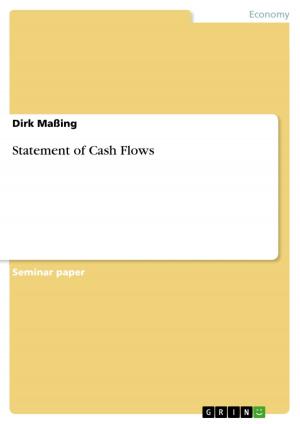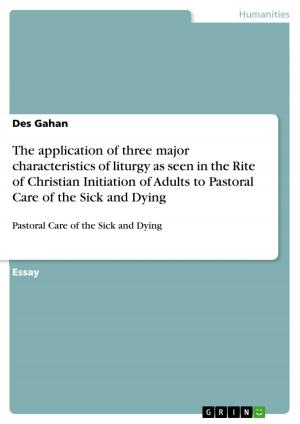Air Transport in the UK: Current Trends and Future Scenarios
Nonfiction, Reference & Language, Study Aids, ESL, Foreign Languages| Author: | Irina Romanova | ISBN: | 9783638359702 |
| Publisher: | GRIN Publishing | Publication: | March 22, 2005 |
| Imprint: | GRIN Publishing | Language: | English |
| Author: | Irina Romanova |
| ISBN: | 9783638359702 |
| Publisher: | GRIN Publishing |
| Publication: | March 22, 2005 |
| Imprint: | GRIN Publishing |
| Language: | English |
Seminar paper from the year 2004 in the subject English Language and Literature Studies - Culture and Applied Geography, grade: 1,0, University of Paderborn, course: Great Britain Today: Topics in Current British Affairs, 26 entries in the bibliography, language: English, abstract: Contribution of aviation to the UK economy The aviation industry has brought many benefits to society in both economic and social terms. The relative affordability and speed of air transport today have made international travel accessible to many people and it has become an integral part of their lifestyle. In economic terms, aviation contributes to a country´s growth in two ways. First, the growth of the aviation industry itself generates employment, production, exports, value added, investment and contributions to the Exchequer. Secondly, air transport facilitates trade in goods, industrial developments and economic services. Contribution to GDP: Aviation accounts for 1.2% of national GDP. By including retailing and catering at airports it makes up 1.4% of GDP. The official Oxford Economic Forecasting study1 estimated that over the last 10 years aviation growth had increased output in the UK economy by £550 million per year.2 Exports: One third of the UK exports now go by air. Exports of services, which depend on the ability to travel by air, make up a further 8% of the national income.3 Tourism: Today, UK residents make around 60 million visits overseas each year, compared to just 13 million in 1978. Around 80 % of these are made by air due to the fact that they have little alternative to air travel for long-haul, and many short-haul, destinations. This outbound tourism contributes significantly to the economy through revenue earned, for instance, by tour operators. Another source of earnings is foreign visitors, two thirds of whom (ca. 55 million out of 80 million) come by air. In-bound tourism accounted for an estimated 4.4 % of GDP in 2002, and more than 2 million direct jobs.4 ... --- 1 The report was produced in 1999 for a consortium of UK's major airlines and operators and the Department the Environment, Transport and the Regions. 2 Whitelegg, J., Whilliams, N., 'The Plane Truth: Aviation and the Environment' 2000 www. aef.org.uk/PDFs/5389SainsburyDoc.pdf 3 Department for Transport, 'The Future of air Transport' 2003, www.dft.gov.uk/aviation/whitepaper 4 Department for Transport...
Seminar paper from the year 2004 in the subject English Language and Literature Studies - Culture and Applied Geography, grade: 1,0, University of Paderborn, course: Great Britain Today: Topics in Current British Affairs, 26 entries in the bibliography, language: English, abstract: Contribution of aviation to the UK economy The aviation industry has brought many benefits to society in both economic and social terms. The relative affordability and speed of air transport today have made international travel accessible to many people and it has become an integral part of their lifestyle. In economic terms, aviation contributes to a country´s growth in two ways. First, the growth of the aviation industry itself generates employment, production, exports, value added, investment and contributions to the Exchequer. Secondly, air transport facilitates trade in goods, industrial developments and economic services. Contribution to GDP: Aviation accounts for 1.2% of national GDP. By including retailing and catering at airports it makes up 1.4% of GDP. The official Oxford Economic Forecasting study1 estimated that over the last 10 years aviation growth had increased output in the UK economy by £550 million per year.2 Exports: One third of the UK exports now go by air. Exports of services, which depend on the ability to travel by air, make up a further 8% of the national income.3 Tourism: Today, UK residents make around 60 million visits overseas each year, compared to just 13 million in 1978. Around 80 % of these are made by air due to the fact that they have little alternative to air travel for long-haul, and many short-haul, destinations. This outbound tourism contributes significantly to the economy through revenue earned, for instance, by tour operators. Another source of earnings is foreign visitors, two thirds of whom (ca. 55 million out of 80 million) come by air. In-bound tourism accounted for an estimated 4.4 % of GDP in 2002, and more than 2 million direct jobs.4 ... --- 1 The report was produced in 1999 for a consortium of UK's major airlines and operators and the Department the Environment, Transport and the Regions. 2 Whitelegg, J., Whilliams, N., 'The Plane Truth: Aviation and the Environment' 2000 www. aef.org.uk/PDFs/5389SainsburyDoc.pdf 3 Department for Transport, 'The Future of air Transport' 2003, www.dft.gov.uk/aviation/whitepaper 4 Department for Transport...















